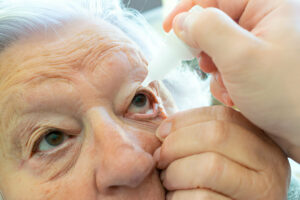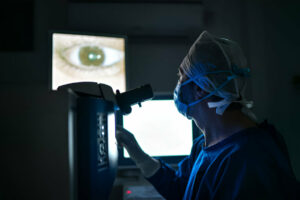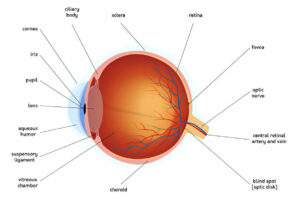
Hypertensive Retinopathy affects the veins and arteries that supply blood to your retina in your eye, resulting in leakage, narrowing, or even cracking of these vessels. At THIRDCOAST RETINA we can assist in treating this eye disease in order to help avoid serious complications, including possible loss of eyesight.
Studies indicate that mild hypertensive retinopathy, with generalized and focal areas of retinal arteriolar narrowing as well as microaneurysms, hard exudates, cotton wool spots being the hallmarks of mild retinopathy, is strongly linked with subclinical and clinical cardiovascular diseases, including stroke and congestive heart failure.
Lowering High Blood Pressure
High blood pressure or hypertension damages the retina (the light-sensitive layer that lines the back of the eye), where small blood vessels become damaged and swell, reducing their ability to provide essential blood supply to parts of the retina resulting in decreased vision.
Hypertensive Retinopathy (HTR) is a condition caused by chronic high blood pressure. Numerous studies have established its link to systemic vascular disease, including stroke. Uncontrolled hypertension can damage cardiovascular, renal, and cerebrovascular systems responsible for blood flow and circulation.
Hypertensive Retinopathy can be divided into four stages depending on its severity of retinal changes: Grade 1 is mild generalized retinal arteriolar narrowing while grade 2 includes more severe generalized and focal area narrowing as well as av nicking; grade 3 includes hemorrhages and cotton wool spots while Grade 4, or Malignant Hypertensive Retinopathy, is distinguished by swelling of both optic disk and macula.
Retinopathy may not cause pain, but left untreated it can lead to vision loss. A dilated fundoscopic exam should be used to diagnose the severity of retinopathy.
At the core of hypertensive retinopathy treatment lies lowering your blood pressure using medication, diet, or lifestyle change. Your healthcare team should work closely together for consistent follow up in order to keep blood pressure at a manageable level.
Your doctor can observe the blood vessels of your retina directly during a dilated eye exam, reflecting their state and that of other blood vessels in the rest of your body. Retinal blood vessels tend to mirror this relationship: mild hypertensive retinopathy grades 1 and 2 tends to correlate with current and previous blood pressure levels; moderate (grade 3) signs such as generalized retinal arteriolar narrowing, hemorrhages and hard exudates are more strongly related with systemic cardiovascular diseases such as cardiovascular diseases as well as kidney damage than similar signs in milder forms of hypertensive retinopathy grades 1 & 2.
Medications
Hypertensive retinopathy treatment typically relies on tight control of blood pressure to manage exudative changes that threaten vision-threatening macular edema or hemorrhages in the retina, similar to diabetic retinopathy. Medication for this may include beta blockers, diuretics, calcium channel blockers, angiotensin receptor antagonists or angiotensin converting enzyme inhibitors – in some instances patients may require intravitreal injection of vascular endothelial growth factor (VEGF).
Hypertensive retinopathy increases risk for cardiovascular disease as its progression correlates directly with past and current blood pressure levels, so comprehensive eye examination provides invaluable clinical data that allows risk stratification for cardiovascular diseases.
Mild retinopathy signs, including generalized and focal retinal arteriolar narrowing, arteriovenous nicking, and microaneurysms are only loosely associated with cardiovascular diseases; however moderate signs such as retinal hemorrhages and cotton wool spots have strong associations with subclinical coronary heart disease and congestive heart failure – suggesting retinopathy could serve as a marker of preclinical systemic cardiovascular disease without traditional risk factors.
Blocked retinal vessels may cause the optic disk, where the optic nerve connects to the eye, to swell (known as macular edema). This blockage occurs due to fluid leaking from retinal blood vessels.
As the edema worsens, it can result in macular scarring and serous macular detachment which cause vision loss. Patients at this stage of hypertensive retinopathy require frequent follow-up visits to an ophthalmologist as well as aggressive management of their blood pressure in order to avoid vision-threatening complications.
Even though hypertension and retinopathy share an intimate link, their relationship is not causative. Retinopathy does not lead to high blood pressure but is instead the result of chronically elevated levels. Therefore, for treating hypertension effectively it’s best to maintain levels within normal range through diet, exercise, limiting smoking and salt intake as well as diet or prescription management by primary care physicians; any potential sources such as cholesterol levels, renal function issues or urinalysis should also be assessed and addressed appropriately.
Surgery
Hypertension can lead to leakage, blockages and other complications in the retinal vascular disease that is known as retinal vascular disease and could result in vision loss. Clinton Warren, MD of THIRDCOAST RETINA in Kenosha WI can treat many forms of this condition and help you avoid serious consequences like losing your eyesight.
Eye exams provide doctors with a unique opportunity to directly observe the microvasculature inside them. A dilated fundoscopic exam may reveal narrowing of blood vessels (hypertensive retinopathy) as well as hemorrhages or areas of poor circulation corresponding to poor blood flow; even severe forms can include optic disc swelling (macular edema) with cotton-wool spots or hard exudates present.
Hypertensive retinopathy usually begins without noticeable visual symptoms in its early stages; however, damage to retinal blood vessels is progressive and untreated can result in vision loss. When your condition progresses to moderate stages, you will probably notice your visual field becoming blurry or dark, making fine details harder to see clearly and possibly headaches and eye pain as it progresses further.
Moderate hypertensive retinopathy can typically be managed through controlled reduction of blood pressure. In certain instances, patients may require further evaluation of cardiovascular risk factors like cholesterol levels and possible treatment to lower them or implement risk reduction therapies as needed.
If your hypertensive retinopathy is severe, in addition to medications it may be necessary to undergo surgery as part of its treatment. There are various surgical options available to patients with severe vision-threatening hypertensive retinopathy. Laser photocoagulation can help to decrease macular edema and fluid buildup, and injections of bevacizumab can be used to help people with diabetic retinopathy reduce macular edema as well. You can administer these injections yourself using an injector at home or via the doctor. Results can often be rapid and dramatic – improving vision in as little as one month! Additionally, blood pressure medications should continue to help you manage blood pressure effectively alongside these treatments.
Follow-Up
Hypertension can damage multiple body organs, including kidneys, cerebrovascular system and retina. Poorly managed hypertension causes three forms of eye damage: choroidopathy, retinopathy and optic neuropathy in the eye. Hypertensive retinopathy occurs when retinal blood vessels become damaged as a result of hypertension; vasoconstriction results in gradual degradation in microvasculature of retinal capillaries and arteries resulting in hypertensive retinopathy affecting this particular part of retina.
Hypertensive retinopathy typically does not produce any symptoms and will be diagnosed through a comprehensive dilated eye exam, where an ophthalmologist will observe narrowing of retinal vessels, hemorrhages and areas of whitening associated with blood blockages in retinal veins and arteries. Left untreated, this can cause vision loss through retinal vessel occlusion that causes macular edema or swelling of the optic disc resulting in macular edema and swelling of the optic disc.
Studies revealed that patients suffering from hypertensive retinopathy were at greater risk for cardiovascular complications, including heart disease and stroke. Hypertensive retinopathy is an indicator of systemic arteriosclerotic changes to the blood vessels and has been linked with cardiovascular disease elsewhere in the body. Hypertensive Retinopathy‘s symptoms depend on its severity, with mild generalized retinal arteriolar narrowing often being the earliest sign; mild generalized narrowing may include several small areas of retinal narrowing with diffuse or patchy appearance and macular edema as symptoms; grade 2 involves more severe and widespread signs such as more extensive generalized retinal arteriolar narrowing, focal areas of narrowing, macular edema and cotton wool spots; while grade 3 (accelerated hypertensive Retinopathy).
Treatment of hypertensive retinopathy typically begins with effective blood pressure management using medications like beta blockers, diuretics, calcium channel blockers and angiotensin converting enzyme inhibitors. Laser therapy may also be employed in severe cases associated with non-clearing vitreous hemorrhage as well as management of macular edema caused by diabetic retinopathy or other causes. Follow-up care should also be regularly provided by both an ophthalmologist and primary care physician to ensure consistent follow-up care for optimal treatment outcomes.














